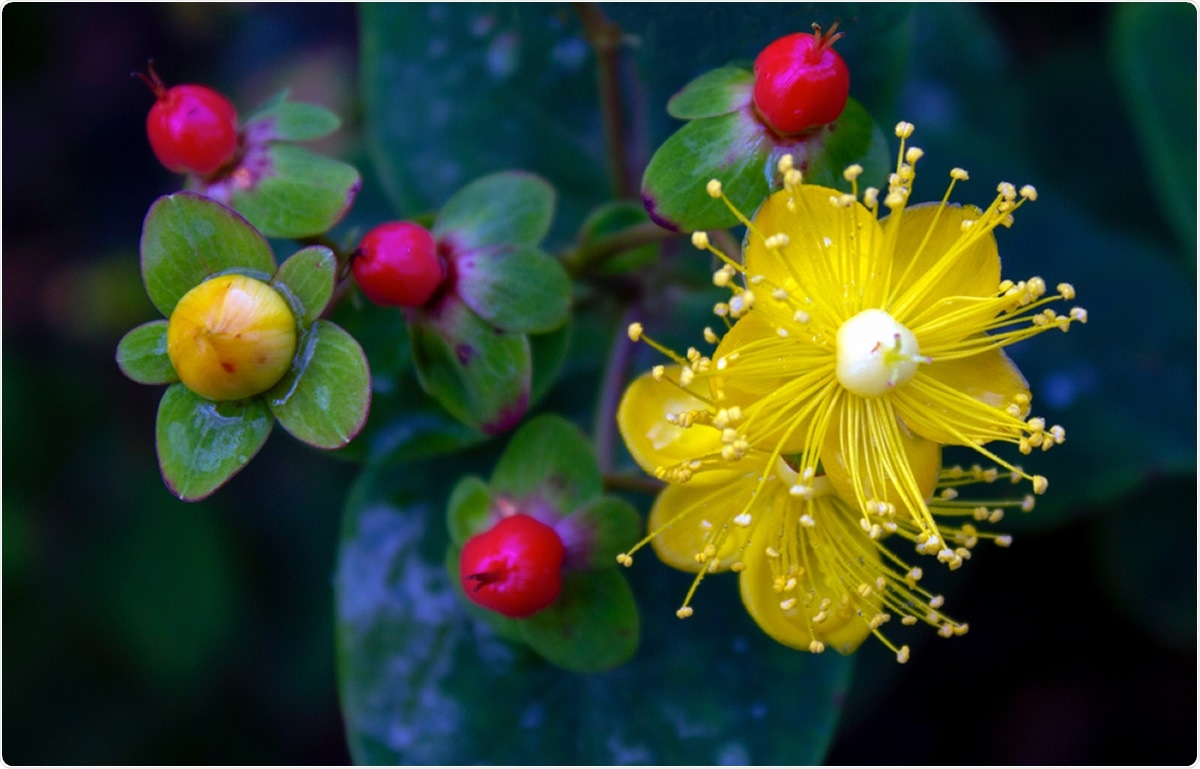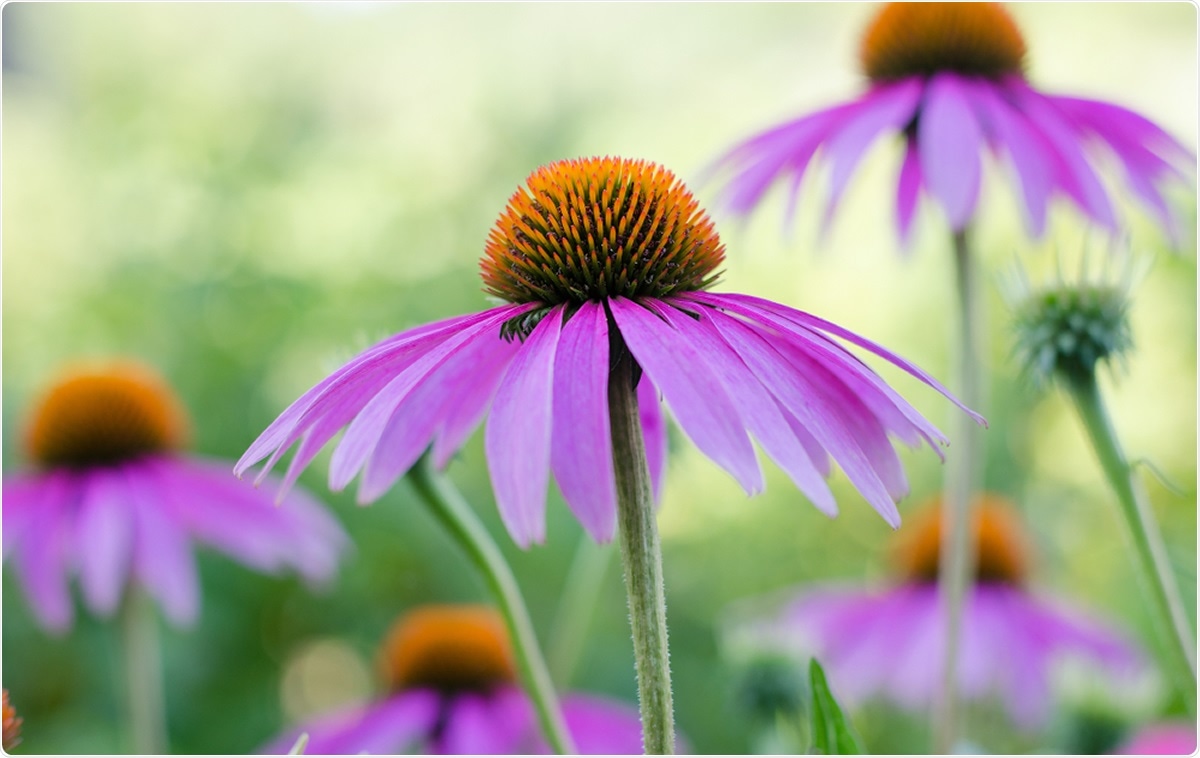Researchers in Saudi Arabia have conducted a study demonstrating the antiviral effects of two medicinal herbs against severe acute respiratory syndrome coronavirus 2 (SARS-CoV-2) – the agent that causes coronavirus disease 2019 (COVID-19).
The effects were most potent when cells were treated with H. perforatum. A combination of the two herbs was the second most effective, and treatment with Echinacea alone was the least effective.
Leena Hussein Bajrai and colleagues from King Abdulaziz University in Jeddah recommend that clinical trials are initiated to investigate the herbs as potential treatments for SARS-CoV-2 infection.
A pre-print version of the research paper is available on the bioRxiv* server, while the article undergoes peer review.

Saint John's Wort. Image Credit: Tessaluna / Shutterstock

 This news article was a review of a preliminary scientific report that had not undergone peer-review at the time of publication. Since its initial publication, the scientific report has now been peer reviewed and accepted for publication in a Scientific Journal. Links to the preliminary and peer-reviewed reports are available in the Sources section at the bottom of this article. View Sources
This news article was a review of a preliminary scientific report that had not undergone peer-review at the time of publication. Since its initial publication, the scientific report has now been peer reviewed and accepted for publication in a Scientific Journal. Links to the preliminary and peer-reviewed reports are available in the Sources section at the bottom of this article. View Sources
Effective antivirals are urgently needed
Although most SARS-COV-2 infections cause mild-to-moderate COVID-19, a substantial proportion leads to severe disease characterized by vasculitis, coagulopathy, and multi-organ damage that can lead to death. Such advanced disease can be caused by the overproduction of certain cytokines such as tumor necrosis factor-alpha (TNF-α), interleukin -6 (IL-6), and interferon-gamma (IFN-γ).
Although some vaccines protecting against SARS-CoV-2 infection have recently become available, their efficacy is a topic of intense debate, particularly since new variants have arisen in the virus's genomic structure.
Effective antivirals are therefore still urgently needed as treatment approaches, says the team.

Echinacea. Image Credit: Mitand73 / Shutterstock
More about the medicinal plants
H. perforatum or St. John's Wort has long been known for its medicinal effects across a range of bacterial and viral infections. In vitro and in vivo studies have previously demonstrated the antiviral activity of H. perforatum against infectious bronchitis virus (IBV), hepatitis C, and coronaviruses other than SARS-CoV-2.
Three species of Echinacea (Purple cone Flower), namely E. angustifolia, E. purpurea, and E. Pallida, have also traditionally been used as remedies to treat influenza and to boost the immune system. In vivo and in vitro studies have previously shown that Echinacea influences cytokine production, increases expression of the lymphocyte activation marker CD69, and reduces the severity of illness.
One study conducted in 2009 showed that E. purpurea extract inhibits infection with H5N1 influenza by blocking the receptor-binding activity of the virus.
What did the researchers do?
The team investigated the antiviral effects of H. perforatum and two Echinacea species (E. purpurea and E. angustifolia) on Vero E6 cells incubated with SARS-CoV-2. The effects of treating the cells with a mixture of the herbs (H.E) were also investigated.
Their mode of action was assessed using three approaches: direct treatment of virus-infected cells, pre-treatment of cells prior to viral infection, and a virucidal activity assay.
Quantitative real-time polymerase chain reaction (qRT-PCR) was used to measure the mRNA expression of the RNA-dependent RNA polymerase (RdRP) gene, viral load, and virus neutralization every 12, 16, 24, 36, and 48 hours post-infection.
What did the study find?
When virus-infected cells were treated with the extracts, H. perforatum showed the greatest efficacy, with an IC50 value (concentration that inhibits 50% of target) of 1.56mg/mL, followed by the H.E mixture (IC50: 6.25mg/mL), and Echinacea (IC50: 6.25mg/mL).
The greatest reduction in viral load was observed for H. perforatum, followed by the H.E. mixture and Echinacea. Both H. perforatum and the H.E mixture reduced viral load for up to 36 hours, while Echinacea reduced it for up to 24hrs of addition.
Next, the cells were incubated with the extracts at 37°C for two hours prior to infection. The effective concentration was highest for H. perforatum, at 1.56 µg/mL, followed by the H.E. mixture (6.25 mg/mL) and Echinacea (6.25 mg/mL).
For the virucidal activity assay, SARS-CoV-2 was incubated with the extracts for two hours before it was added to cells. Again, H. perforatum exhibited the greatest effect, followed by the H.E mixture, and Echinacea. Incubation with H. perforatum or the H.E mixture reduced viral load for more than 48 hours, while Echinacea reduced viral load for up to 36 hours.
"H. perforatum showed the highest inhibitory effect in all three antiviral assays, while Echinacea showed the lowest inhibitory effect," writes the team.
Future directions
The researchers say the study provides clear evidence for the first time that a mixture of H. perforatum and Echinacea demonstrates anti-SARS-CoV-2 activity. They suggest testing whether the mixture can boost the inhibition of the virus in clinical trials.
The mixture could be useful for treating SARS-CoV-2-infected patients with mild or severe disease and for protecting people who have contact with infected patients, says Bajrai and colleagues. However, treatment with H. perforatum is preferable since it demonstrated a higher efficacy, they add.
The researchers also recommend using either Echinacea or H.E as a prophylactic approach to SARS-CoV-2 infection.

 This news article was a review of a preliminary scientific report that had not undergone peer-review at the time of publication. Since its initial publication, the scientific report has now been peer reviewed and accepted for publication in a Scientific Journal. Links to the preliminary and peer-reviewed reports are available in the Sources section at the bottom of this article. View Sources
This news article was a review of a preliminary scientific report that had not undergone peer-review at the time of publication. Since its initial publication, the scientific report has now been peer reviewed and accepted for publication in a Scientific Journal. Links to the preliminary and peer-reviewed reports are available in the Sources section at the bottom of this article. View Sources
Journal references:
- Preliminary scientific report.
Bajrai L, et al. In vitro screening of antiviral and virucidal effects against SARS-CoV-2 by Hypericum perforatum and Echinacea. bioRxiv, 2020. doi: https://doi.org/10.1101/2021.01.11.426295, https://www.biorxiv.org/content/10.1101/2021.01.11.426295v1
- Peer reviewed and published scientific report.
Bajrai, Leena Hussein, Sherif Ali El-Kafrawy, Ahmed Mohamed Hassan, Ahmed Majdi Tolah, Rabie Saleh Alnahas, Sayed Sartaj Sohrab, Mohd Rehan, and Esam Ibraheem Azhar. 2022. “In Vitro Screening of Anti-Viral and Virucidal Effects against SARS-CoV-2 by Hypericum Perforatum and Echinacea.” Scientific Reports 12 (1): 21723. https://doi.org/10.1038/s41598-022-26157-3. https://www.nature.com/articles/s41598-022-26157-3.